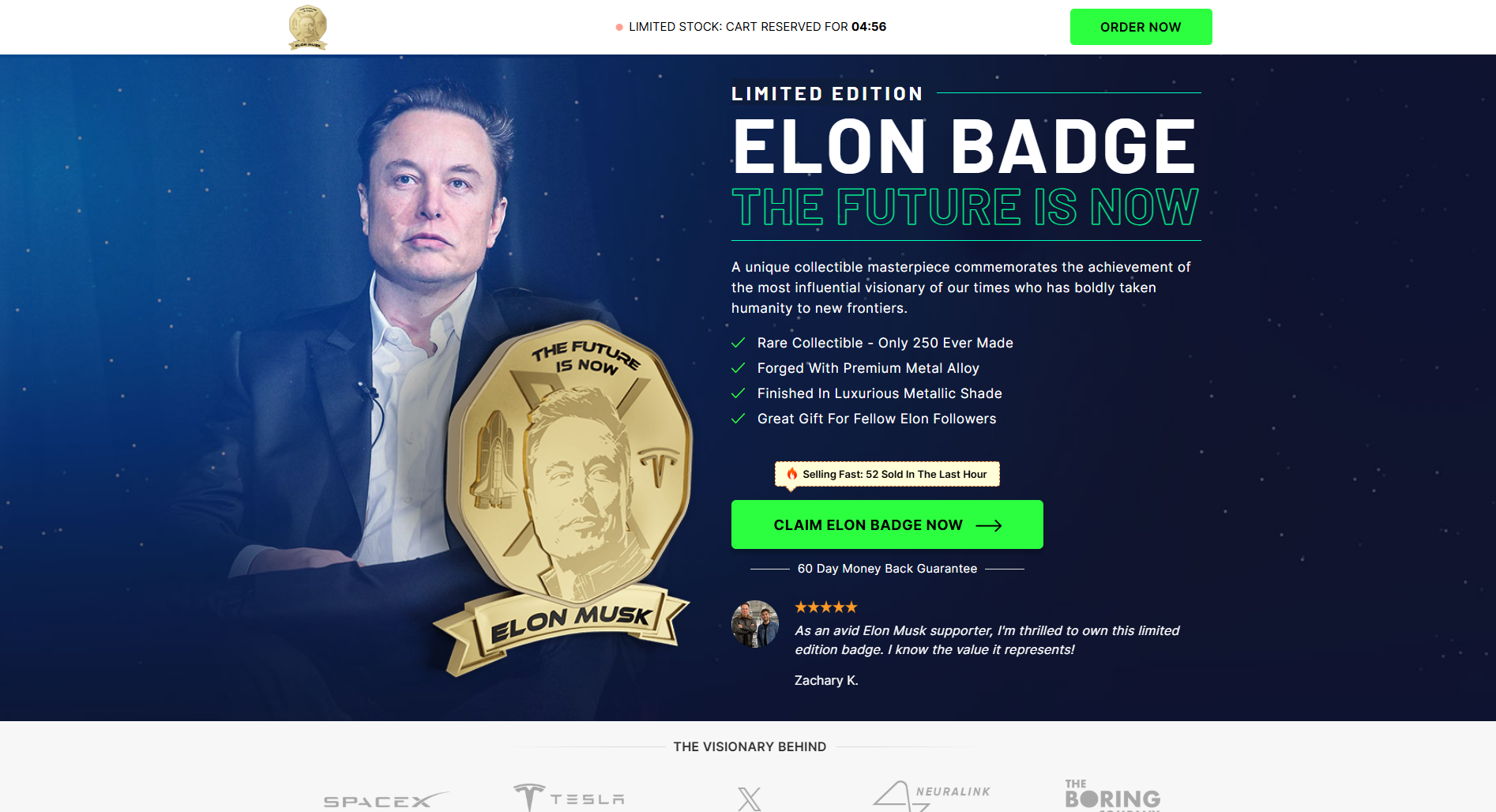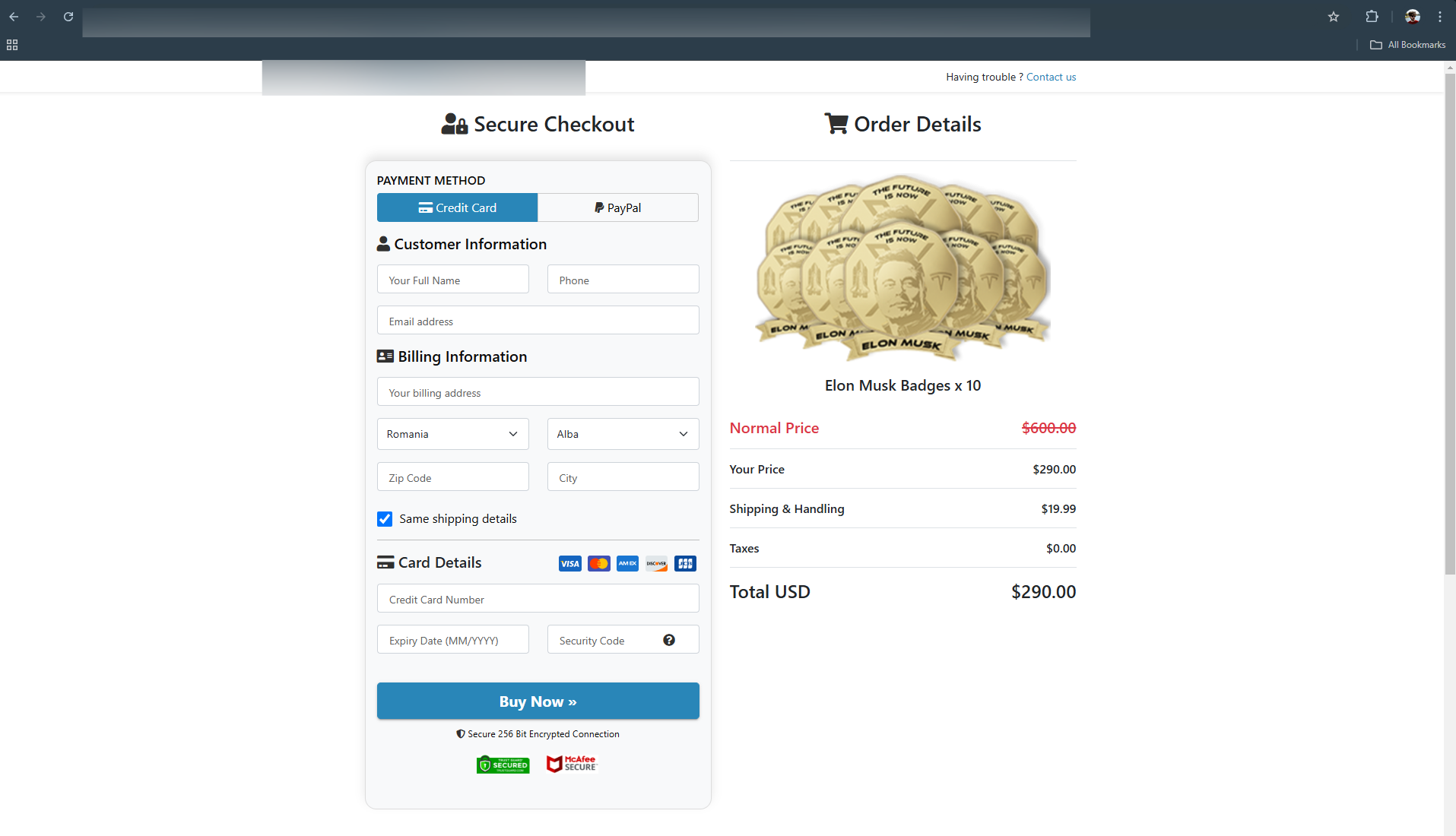Beware of the ‘Elon Musk Golden Badges’ Scam: A Fraudulent ‘Investment’ Scheme Targeting Users On Telegram

When it comes to investment scams, nothing lures potential victims more effectively than a get-rich-quick scheme supposedly endorsed by trustworthy public figures like billionaire Elon Musk.
The latest example is the "Elon Musk Golden Badges" scam—a sophisticated operation designed to deceive users out of their hard-earned money through false high-return promises and fake endorsements.
Bitdefender researcher Andrei Anton-Aanei spotted the scam last week.
What’s It All About?
The scam centers on a fake investment opportunity involving "Elon Musk Golden Badges," marketed as rare collectible coins. Victims are lured into purchasing these badges with the promise of astronomical returns—$2 million for an initial "investment" of $290. Fraudsters falsely claim that prominent figures like Elon Musk and even Bank of America CEO Brian Moynihan endorse the scheme.
The Telegram Connection
This scam relies heavily on Telegram to spread its message. Fraudsters have set up fake channels impersonating Donald Trump, his family, and other public figures. These channels bombard users with promotional messages, often with patriotic appeals and a false sense of urgency.

One particularly misleading message reads:
"GET READY FOR THE GOLDEN AGE BY INVESTING IN THE ELON MUSK GOLDEN BADGES. Bank of America's CEO, Brian Moynihan backs the ELON MUSK GOLDEN BADGES project publicly, offering a strategic exchange of the unique investment. Invest $290 now—cash out for $2,000,000! ONLY SMART PATRIOTS will use this chance. BELIEVE IN PRESIDENT TRUMP and INVEST IMMEDIATELY."
Adding to the confusion, the scammers frequently mix up details about their offerings. For example, while some messages advertise Elon Musk badges, others refer to "Trump Golden Eagles" or even "Trump Coins." This lack of consistency highlights the opportunistic nature of the fraudsters.


The Phony Website
The scam operates through a professional-looking website that mimics a legitimate e-commerce platform.

Interestingly, while the scam's website goes to great lengths to falsely claim endorsements from Elon Musk and other notable figures, it also buries a disclaimer within its pages:
"ElonBadge.com is not affiliated with Elon Musk or any of his companies. This product is an unofficial commemorative item for novelty purposes only. This product does not hold monetary value and is not intended to be used as legal tender or currency."
The disclaimer also explicitly states:
"The information provided on this website is for general informational purposes only and should not be construed as official statements, endorsements, or representations from Elon Musk or any associated entities."
This disclaimer directly contradicts the grandiose claims plastered all over the site and in the Telegram messages promoting the badges. While it may seem like an attempt to avoid legal repercussions, it underscores the scam's duplicitous nature. On one hand, the website entices users with promises of wealth and legitimacy; on the other, it absolves itself of responsibility for the fraudulent claims.
The disclaimer gives them a superficial shield to argue that buyers were informed the product had no monetary value. However, this doesn't change the fact that the promotional messages and the website's design are crafted to deceive.
The website features a "secure checkout" page and claims a "60-day money-back guarantee," all designed to make the operation appear trustworthy. However, the checkout page mentions suspicious disclaimers, such as purchases appearing under the platform's name, and avoids responsibility for financial losses.

Additional major red flags regarding the platform's dubious nature can be seen in the website's "Terms and Conditions." Although lengthy and formal in appearance, it includes numerous clauses and disclaimers designed to protect the operation while providing limited recourse for victims.
Here are some that stood out:
- Refund Policy: The website promises a "60-day money-back guarantee," but vague terms surrounding returns allow scammers to deny refunds easily. The absence of a clear refund process further complicates matters.
- Arbitration and Class Action Waivers: By requiring buyers to waive their rights to a jury trial or class-action lawsuit, the terms limit victims' ability to seek collective legal action.
- No Guarantees on Website Functionality: Despite presenting itself as a professional e-commerce platform, the site disclaims any warranties about its security or freedom from errors.
- Limitation of Liability: The terms cap the scammers' liability to the purchase price, ensuring that victims cannot claim compensation for losses beyond the original payment.
This scam is the latest iteration of a long-running scheme. Fraudsters behind this operation have previously promoted:
- Trump Coin
- Trump Golden Sticker
- Trump Golden Eagle
Each rebranding attempts to capitalize on trending topics or figures to lure new victims, but the underlying tactics remain the same—fake endorsements, promises of massive returns, and high-pressure sales tactics.
Victims who fall for the scam risk financial loss and personal data theft.
How to Spot and Avoid Similar Scams
1. Read Terms and Conditions Carefully: If a website's terms are unusually complex, vague, or contradictory, treat it as a red flag.
- Use Scam-Detection Tools: Bitdefender Scamio, our FREE scam-busting chatbot helps you detect and avoid scams across multiple online platforms.
- Verify Links: With Bitdefender Link Checker, you can safely analyze links shared on social media or messaging platforms. This tool provides instant feedback on whether a URL is safe to visit.
- Check Domain Age: Use tools to determine when a website domain was registered. New domains are a red flag.
- Be Skeptical of Pressure Tactics: Scammers often create a sense of urgency to prevent victims from thinking critically.
- Research Before Investing: Look for independent reviews and verify claims on official channels.
If you encounter this scam, report it to your local cybercrime authority or use platforms like the FTC's ReportFraud and the BBB to submit a complaint. Additionally, block and report the fraudulent Telegram channels promoting these schemes.
tags
Author
Alina is a history buff passionate about cybersecurity and anything sci-fi, advocating Bitdefender technologies and solutions. She spends most of her time between her two feline friends and traveling.
View all postsRight now Top posts
How to Protect Your WhatsApp from Hackers and Scammers – 8 Key Settings and Best Practices
April 03, 2025
Outpacing Cyberthreats: Bitdefender Together with Scuderia Ferrari HP in 2025
March 12, 2025
Streamjacking Scams On YouTube Leverage CS2 Pro Player Championships to Defraud Gamers
February 20, 2025
How to Identify and Protect Yourself from Gaming Laptop Scams
February 11, 2025
FOLLOW US ON SOCIAL MEDIA
You might also like
Bookmarks







